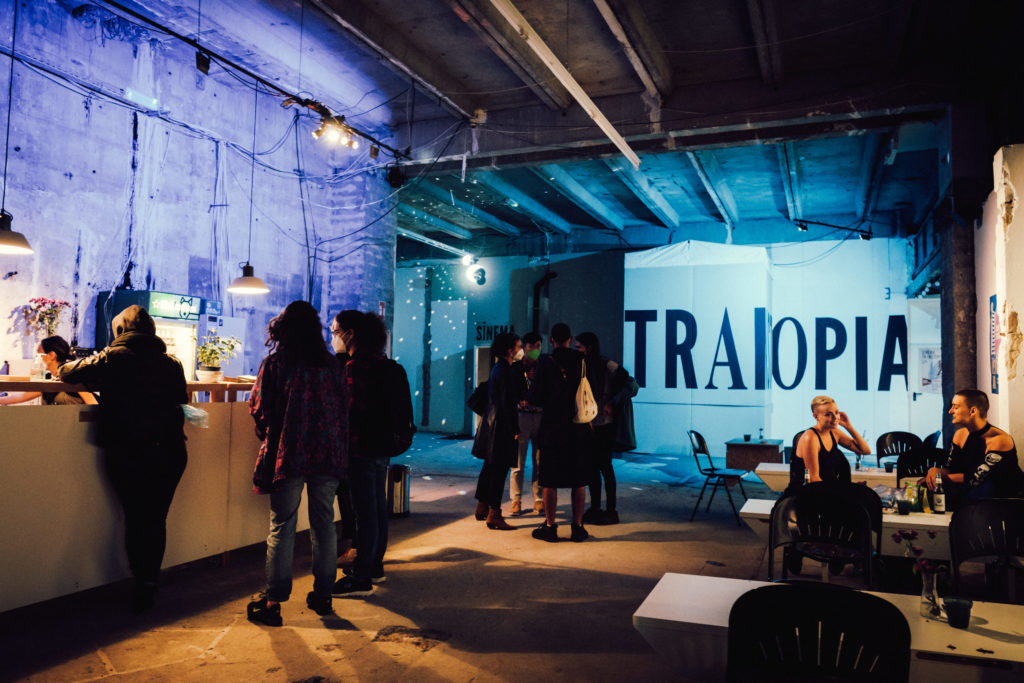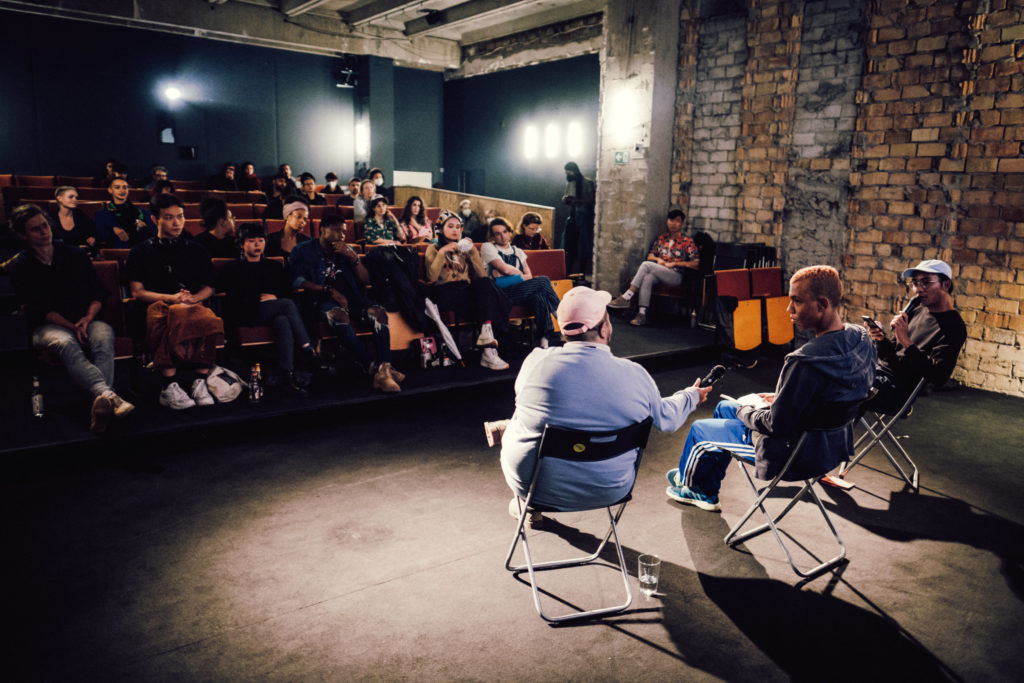Where something like a community develops
Interview with Malve Lippmann and Can Sungu, SİNEMA TRANSTOPIA
 (Credit: Marvin Girbig)
(Credit: Marvin Girbig)
Through your cinema-experiment SİNEMA TRANSTOPIA, you offer an alternative space for cinema culture in Berlin, fostering transnational, diasporic perspectives. What challenges have you faced in navigating the German film industry and funding system, and what are your aims for systemic change in the future?
Back in 2014, we founded bi’bak as a cultural space located in a former local store facing a central street in Wedding. At that time, we had the feeling that certain discourses were missing from the cultural landscape in Berlin, and that there were no spaces fostering transnational perspectives. With bi’bak, we wanted to offer a safe space where transnational diasporic perspectives and knowledge emerging from marginalised majorities could meet. We started curating various film series at bi’bakino, a sort of film club, where we were dealing with a way of remembering that highlights how memory cultures are interwoven and can learn from each other, beyond nation-statehood. In September 2020, we opened an independent cinema space, SİNEMA TRANSTOPIA, dedicated to the film programme of bi’bakino.
SİNEMA TRANSTOPIA is a cinema experiment located at Haus der Statistik, a building complex near Alexanderplatz in Berlin. Through this project we wanted to explore how cinema can operate as a space for political and social discourse, exchange and solidarity, where postcolonial and migrant perspectives can be represented while challenging the Eurocentric gaze. Nowadays, it seems more important than ever to create space for the transnational society we live in, where stereotypes and racism are deconstructed by critically looking at recurring narratives and existing image politics and challenging them through migrant/post-migrant perspectives. This is why we wanted to integrate the term “transtopia”, coined by the cultural scientist Erol Yıldız, into the name of our cinema SİNEMA TRANSTOPIA. “Transtopia” is a place, as Yıldız puts it, where “cross-border ties and connections converge, are reinterpreted and condensed into everyday contexts”.
Our contract for our space at Haus der Statistik ends in July 2022, so after the Cinema of Commoning Symposium we have to move once again. This is related to a challenge that is haunting other cultural venues as well, the ongoing capitalisation of urban areas and the resulting lack of space for independent arts institutions. It has become extremely difficult to find suitable places for cultural use in Berlin. Due to the sale of state-owned properties in the ‘00s, the public sector is unable to give access to spaces for cultural actors in a way that is uncomplicated and financially viable. Although there are some spaces to rent at the centre of the city, private owners or housing associations are now demanding between 25.00 and 45.00 euros per square metre for unrenovated buildings. This makes it extremely difficult for cultural spaces to afford rent. As a result, the choices for finding a permanent location for a cultural project are getting less and less. Nevertheless, we must not give in and we must continue to demand access to such space in the city. We need places that can facilitate discourses on how politics has an impact on the private sphere of people’s lives; on the more “intimate” aspect of social struggles; on the communities and realities that are placed under threat by a hyper capitalist society.
Thinking through the current state of affairs with cinemas after the pandemic, we are convinced about the following: only with a solid funding structure can we sustainably secure a future for cinema as a cultural practice while making room for culture, education and accessible political/cultural film work. We believe that it is very important that we, a space for film culture, should be able to define the content of our programmes without being limited by economic restraints. Overall, this is what we have been trying to do through SİNEMA TRANSTOPIA over the last two years.
The pandemic has shifted the interest of the industry and film distribution overall from theatres to streaming platforms. However, SİNEMA TRANSTOPIA has been resisting this logic, as you have continued to offer a rich programme full of screenings, workshops and solidarity events at your space in Alexanderplatz. Could you elaborate a bit more on your commitment to creating space for in-person gatherings, and why you think it’s important to maintain a cinema culture beyond streaming?
The cultural practice of cinema – watching a film together in a physical space – has interested us since the very beginning of bi’bak. Cinema is directly linked to placemaking, as it creates a place conceived specifically for the occasion of a screening; this space is specific to the screening’s time, film and audience that attends the screening. Watching films carries with it the capacity for radical change of perspective, and allows for the exchange of ideas with filmmakers, experts and the other members of the audience. The discussions that take place before, during and after a screening are an integral part of our work; such conversations become even more meaningful when shared in physical space amongst people who are physically present. In an ideal scenario, the audience actively shapes this space by joining in and having discussions with other people who are attending the event. It is also important for curators or invited guests to create room for reflections on the screening and to open up further dialogue directions beyond the film. For us, it is not about whether or not you liked the film, but rather what impact it had on you. The exchanges take place organically and spontaneously, and are very much focused on the here-and-now, since we do not record the discussions or offer to broadcast them live. Even when the pandemic began, we wanted to host events in a physical space as soon as possible, and we consciously decided against online screenings.
SİNEMA TRANSTOPIA is a place where you come back again and again, where something like a community develops. In that sense, SİNEMA TRANSTOPIA goes beyond the general notion of cinema and encompasses not only the screening room, the film and the foyer, but also its connections to the community and the neighbourhood; the immaterial, discursive, imaginary space emerging from the interplay between cinema, curators, filmmakers, guests, audience and the urban. People come to the cinema not only for the screenings, but also because they like to spend time there and meet new people. We see SİNEMA TRANSTOPIA as a place of learning and unlearning, where we try things out, where we exchange ideas and find the courage to realise new ideas. We also regularly invite professional experts to share their knowledge with the community in the form of workshops.
 (Credit: Marvin Girbig)
(Credit: Marvin Girbig)
Was there a film programme or event that took place at SİNEMA TRANSTOPIA in the past few months that particularly moved you? Could you explain why?
In the series Materiality of Memories: (Post-)Yugoslavian experiences, curators Borjana Gaković and Madeleine Bernstorff looked into the traumas caused by the Yugoslav war. The series consisted mostly of personal, autobiographical films to Borjana and Madeleine, as they wanted to highlight how these traumas were inscribed in female bodies and perpetuated into the next generation. At the last event, there were some young people in the audience whose parents had fled to Berlin from various former Yugoslavian countries. They were all born in Berlin, so they had not experienced the war themselves. They approached Borjana and thanked her for giving them the opportunity to talk about a past that had continued to burden them so far. They said that it was difficult to find a way to talk about these issues with their parents. Borjana, who herself experienced the war as a child, talked with them for a long time at the foyer. The films can trigger something in us, can cause something; sometimes it is a matter of absorbing that and letting it live on. The series took place almost parallel to the start of the war in Ukraine and it became clear to us that new transgenerational war traumas are being produced anew every day. Sometimes you feel very powerless and yet it helped us all to come together in the cinema room and exchange ideas.
How did the idea of Cinema of Commoning emerge? Which are your thoughts about the future steps of developing sustainable, transnational structures for cinema spaces around the globe?
Cinema of Commoning centres the notion of cinema as an artistic practice, contributing to the realisation of a utopia of urban commons. “Commoning” refers to a type of living in the public sphere that is not organised by the state and is not profit-oriented, but instead strives for equality and solidarity; a society in which everyone can participate (Peter Linebaugh 2008, Stavros Stavrides 2016). A continuous negotiation of the diverse, hierarchical and complex social and economic relations in public space is essential, in order to better understand the notion of commoning. Cinema of Commoning invites international actors who have been developing their own alternative cinema projects of the commons, to exchange ideas and reflect together. The Symposium is particularly dedicated to the question of how cinema can contribute towards a society of the commons, and how it can reflect a transnational society shaped by migration and hostile economic policies. Its goal is to bring together various cinema initiatives that have been active worldwide, and to foster the development of alternative cinema concepts both in theory and practice. Cinema of Commoning combines the notion of urban commons with the artistic and social role of cinema in both local and global settings.
Through SİNEMA TRANSTOPIA and other non-commercial cinema initiatives, we can see that cinema has not lost its importance as a place for social and physical gatherings. Filmmakers, curators, audiences and other guests meet in cinemas, hoping to have a shared experience. Being part of the urban environment, cinema has the capacity to create a connection between the neighbourhood and urban space; it can allow our imaginations to transcend geographical and social boundaries. In that sense, cinema is a trans-topia, a site of possibility and of lived utopia, where, through the inclusion of minority experience and knowledge, “another urban self-evidence is produced” (Yıldız 2013). As a transtopian place, cinema links near and distant places, past, present and future. Cinema is particularly important for a transnational society, as it constitutes a place of encounter with multiple social and cultural perspectives, and with various modes of perception and understanding. Following the paradigms of earlier communal cinema models that explored the interconnection of artistic and social practices, Cinema of Commoning invites international actors of independent cinema projects to exchange ideas on their way(s) and methods of, and facilitates the creation of networks and shared strategies for a sustainable cinema, oriented towards the common good on a local and global level.
Malve Lippmann is an artist, curator and cultural manager. As a freelance set designer and artist, she has been internationally responsible for the design of numerous performances, opera and drama productions. Since 2010 Malve Lippmann has been working as a curator and cultural manager, leading artistic workshops and seminars and is active in various cultural and community projects. She is co-founder and artistic director of bi’bak and SİNEMA TRANSTOPIAin Berlin.
Can Sungu is a freelance artist, curator and researcher. He studied film, interdisciplinary art and visual communication design in Istanbul and Berlin. He taught film and video production, curated various film programs and event series on film and migration and participated in numerous exhibitions. He has worked as a juror and consultant for Berlinale Forum, International Short Film Festival Oberhausen and DAAD, among others. He is co-founder and artistic director of bi’bak and SİNEMA TRANSTOPIAin Berlin.